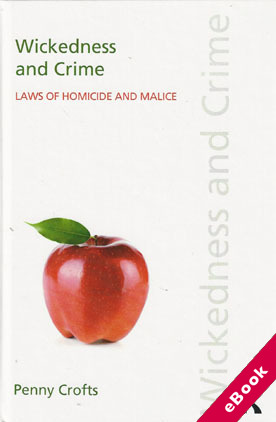
The device(s) you use to access the eBook content must be authorized with an Adobe ID before you download the product otherwise it will fail to register correctly.
For further information see https://www.wildy.com/ebook-formats
Once the order is confirmed an automated e-mail will be sent to you to allow you to download the eBook.
All eBooks are supplied firm sale and cannot be returned. If you believe there is a fault with your eBook then contact us on ebooks@wildy.com and we will help in resolving the issue. This does not affect your statutory rights.
Malice of Law examines how criminal legal doctrine and jurisprudence organises and expresses ideas about wickedness through the prism of malice.
Whilst many legal theorists accept that the criminal legal system is a system of blaming, they do not consider that blaming involves censure or reproof for fault, wrong, badness or wickedness. Historically, the link between criminal law and morality was explicit, and expressed through evaluative terms in offence formulae such as malice and mens rea. Now, however, there is a tendency to think of crime in neutral procedural terms and to avoid reference to its normative elements.
Through an analysis, which is both historical and contemporary, Penny Crofts reverses this modern tendency by addressing how the legal system communicates what it means to be at fault - to be bad, or to be wicked. Despite claims to the contrary, criminal law communicates and sanctions particular models of wickedness.
Arguing that the current dominant idea of wickedness communicated in criminal law lacks nuance and fails to explain much of what the legal system does, Malice of Law examines its implications in terms of the legal subject, social responsibility and the jurisdiction of the legal system.